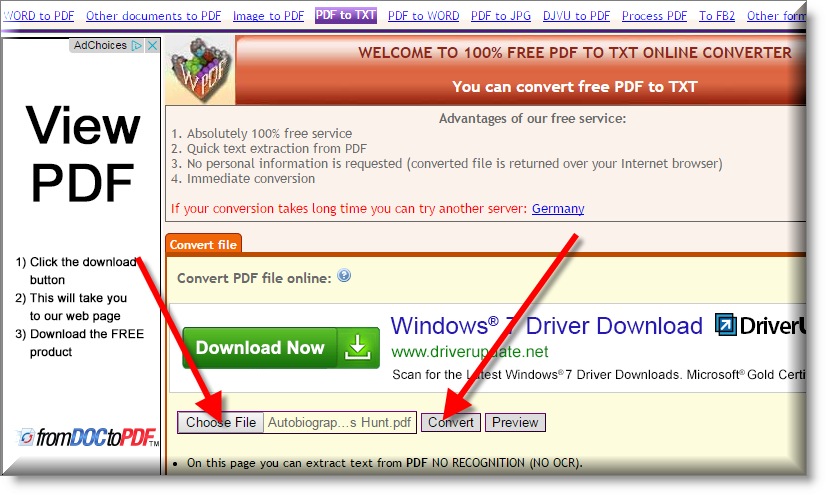Blog

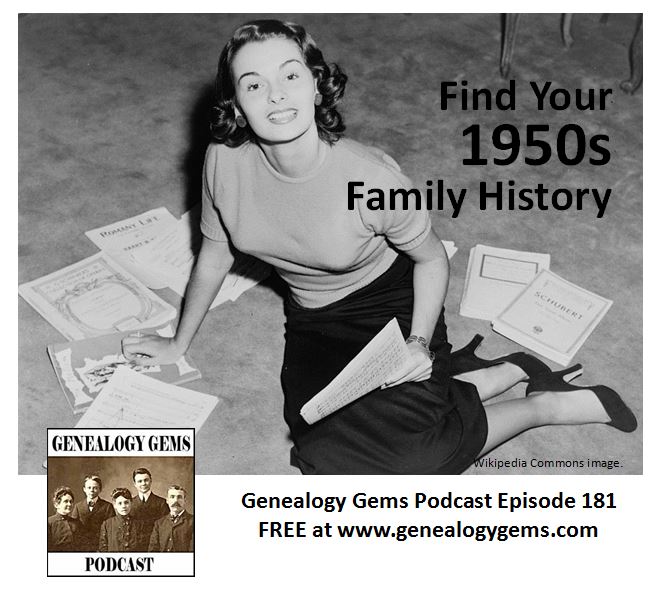
Genealogy Gems Podcast Episode 181
 Sock hops. Drive-ins. Juke boxes. Fuzzy dice. Letterman jackets. Poodle skirts, bobby socks and saddle shoes. Do the 1950s come to mind? They will when you listen to the newly-published Genealogy Gems podcast, episode 181!
Sock hops. Drive-ins. Juke boxes. Fuzzy dice. Letterman jackets. Poodle skirts, bobby socks and saddle shoes. Do the 1950s come to mind? They will when you listen to the newly-published Genealogy Gems podcast, episode 181!
The 1950s are a great era to research your family history, but it may not seem easy at first. Federal censuses (1950 in the U.S. and 1951 in Canada, the U.K. and Australia) are privacy-restricted, and so are many vital records.
In this episode, I’ll inspire you with several very FUN approaches to learning about your family history during this time period. I’ll also give you some tips and factoids about those blacked-out 1950s censuses–including which census had women up in arms because the government asked them to be more honest about their ages!
There’s plenty of news in this episode, too, from a new Google innovation to two new record collections online that fill in some holes in U.S. documentary history (military and African-American). I’ll read some mail from YOU about the new Ancestry site and family history blogging and share some helpful resources. And we announce the latest Genealogy Gems Book Club pick: listen or click here to learn more about that!
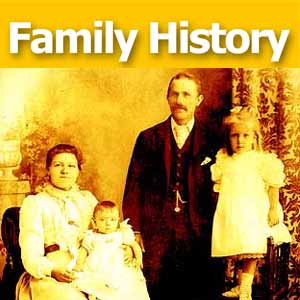 Click here to access Genealogy Gems podcast episode 181. Love this and looking for more? Click here to access the FULL archive of FREE Genealogy Gems podcast episodes. If you love the podcast format but are looking for a more step
Click here to access Genealogy Gems podcast episode 181. Love this and looking for more? Click here to access the FULL archive of FREE Genealogy Gems podcast episodes. If you love the podcast format but are looking for a more step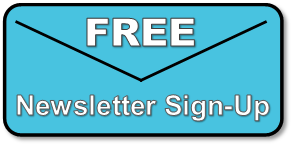 -by-step approach to family history, check out our free Family History Made Easy podcast series.
-by-step approach to family history, check out our free Family History Made Easy podcast series.
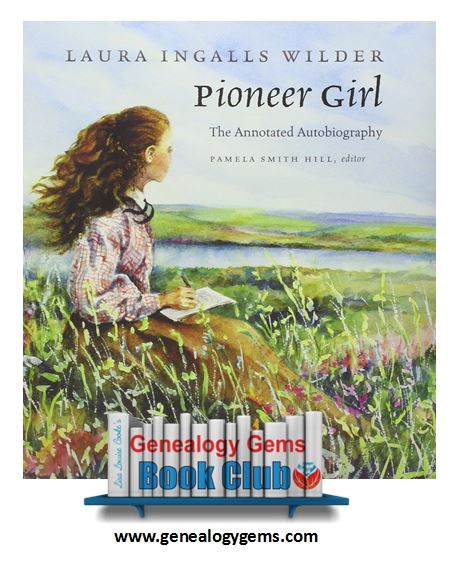
NEW Genealogy Gems Book Club Title: Pioneer Girl (Laura Ingalls Wilder)
 When Lisa and I were young we read the “Little House” series of children’s books about growing up on the western U.S. frontier. These books continue to shape the way Lisa and I imagine our ancestors’ lives during that era. Well, the “grown-up” version of the Little House series has finally been published!
When Lisa and I were young we read the “Little House” series of children’s books about growing up on the western U.S. frontier. These books continue to shape the way Lisa and I imagine our ancestors’ lives during that era. Well, the “grown-up” version of the Little House series has finally been published!
Pioneer Girl: The Annotated Autobiography of Laura Ingalls Wilder, edited by Pamela Smith Hill, is our newest Genealogy Gems Book Club. It’s the never-before-published autobiography Laura wrote in the 1930s. The stories and memories she shares in it are the basis for her popular Little House children’s series.
Across the cover of a dime store paper tablet, Laura scrawled “Pioneer Girl.” Then she filled it with detailed recollections of family, and neighbors, wagon trains and homesteads. In other words, memories of pioneering in an American West that was fading away. Her stories will intrigue–and sometimes stun–any Laura Ingalls Wilder fan.
In the Book Club announcement in Genealogy Gems Podcast Episode 181, I asked Lisa what makes this book a standout and a prime candidate for genealogists. Her answer? “The immaculate research that went into it. The stunning example it sets for source citations, which consume large portions of most of the pages. And the often never seen before photos sprinkled throughout that bring the people and times to life visually for the reader.”
Look for more on Pioneer Girl in the coming two months on the Genealogy Gems podcast and website. In September, Genealogy Gems Premium members will get to enjoy Lisa’s full interview with editor Pamela Smith Hill. We’ll play an excerpt on the free Genealogy Gems podcast.
 Want to see more great titles we’ve recommended? Click here to access the Genealogy Gems Book Club, with best-selling titles: fiction, memoir, history and family histories. OR click here to see our growing list of how-to genealogy titles we love and have featured on Genealogy Gems in the past.
Want to see more great titles we’ve recommended? Click here to access the Genealogy Gems Book Club, with best-selling titles: fiction, memoir, history and family histories. OR click here to see our growing list of how-to genealogy titles we love and have featured on Genealogy Gems in the past.
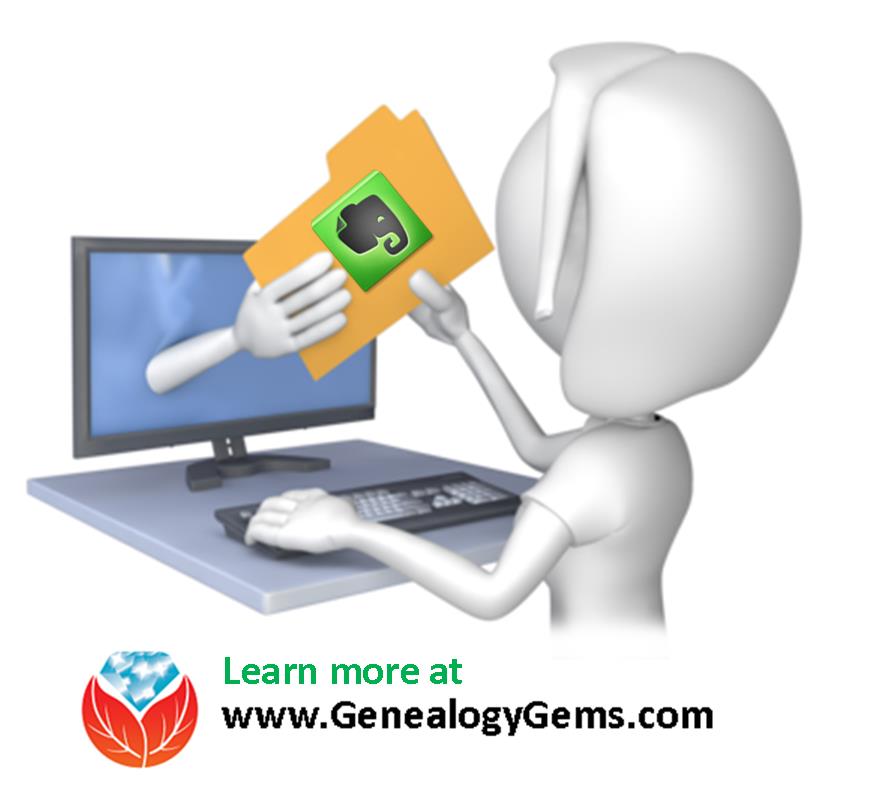
Here’s What Evernote Can and Can’t Do for Family History
 Recently Genealogy Gems Podcast listener Rosie wrote in with an Evernote question:
Recently Genealogy Gems Podcast listener Rosie wrote in with an Evernote question:
“I really enjoy listening to your podcasts. Thanks so much for all your efforts. As a long time researcher I always wondered how the Hunt family got from New England to Ohio around 1800. Not too long ago another researcher found some autobiographical sketches written by Thomas W. Hunt in the Library of Congress. They posted it on Ancestry.com and another researcher sent me the link. I am still trying to figure out Evernote but I am wondering if there is a way to transcribe the sketches from PDF format with this tool.”
Good for Rosie for considering her options for how technology might be able to make the task at hand just a little bit easier!
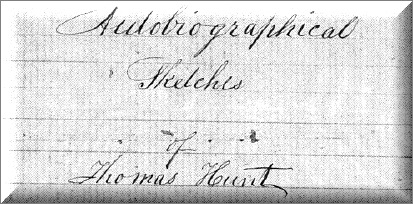 Currently you must have an Evernote Premium account in order for your PDF documents to be keyword searchable or to annotate PDFs directly. The pdf document that Rosie was hoping to automatically transcribe with optical character recognition (OCR) is in cursive handwriting. Evernote can apply OCR to simple, clear printing, but it can’t read script, especially fancier writing such as this Thomas Hunt sketch or old German script and handwriting.
Currently you must have an Evernote Premium account in order for your PDF documents to be keyword searchable or to annotate PDFs directly. The pdf document that Rosie was hoping to automatically transcribe with optical character recognition (OCR) is in cursive handwriting. Evernote can apply OCR to simple, clear printing, but it can’t read script, especially fancier writing such as this Thomas Hunt sketch or old German script and handwriting.A Solution for Type and Printing if you aren’t an Evernote Premium user: If you are fortunate enough to discover a long-sought after genealogical document such as Rosie did, and your PDF document is typed text or simple, neat printing then you are in luck. There are free conversion tools available online that can do the trick. I use ConvertOnlineFree.com to convert my PDF document to text. I like it because I can use the tool directly from the web without having to download software to my computer.
1. click the Choose File
2. select the PDF file I want to convert from my computer
 3. click the Convert button
3. click the Convert button
4. save the converted file to my computer
5. copy and paste the text into a new note in Evernote, and OCR does the rest.
Resources
How to Use Evernote for Genealogy: The Ultimate Education
Evernote for Genealogy laminated quick reference guide, available for for both Windows and Mac users. This guide is handy for everyday reference, and it’s packed with time saving tips you can use every day in your genealogy research.
How to Add Text to a Web Clipping in Evernote
 It’s nice to share
It’s nice to share
Do you know other genealogists who use Evernote? Why not share this post with them? Use our handy social media buttons at the top of this post, or copy the and paste the URL into an email. Your friends will thank you!

